Doris Miller
Doris "Dorie" Miller (October 12, 1919 – November 24, 1943) was an American and United States Navy Cook Third Class who was killed in action during World War II.[1] He was the first black American to be awarded the Navy Cross, the second highest decoration for valor in combat awarded by the Navy, after the Medal of Honor.[2]
Doris Miller | |
|---|---|
 Miller wearing his Navy Cross | |
| Nickname(s) | "Dorie" |
| Born | October 12, 1919 Waco, Texas, U.S. |
| Died | November 24, 1943 (aged 24) USS Liscome Bay, off Makin Atoll, Gilbert and Ellice Islands |
| Allegiance | United States of America |
| Service/ | |
| Years of service | 1939–1943 |
| Rank | Cook Third Class |
| Service number | 356-12-35 |
| Unit | |
| Battles/wars | World War II |
| Awards | |
Miller had served aboard the battleship West Virginia which was sunk by Japanese torpedo bombers during the surprise attack on Pearl Harbor on December 7, 1941. During the attack, he helped several sailors who were wounded including the seriously wounded captain of the ship, and while manning an anti-aircraft machine gun for which he had no training, he shot down Japanese planes.[4] Miller's actions earned him the medal, and the resulting publicity for Miller in the black press made him an iconic emblem of the war for black Americans.[5] In November 1943, Miller was killed while serving aboard the aircraft carrier Liscome Bay when it was sunk by a Japanese submarine during the Battle of Makin in the Gilbert Islands.
The destroyer escort/Knox-class frigate USS Miller (reclassified as a frigate in June 1975), in service from 1973 to 1991, was named after him.[6] On January 19, 2020, the Navy announced that a Gerald R. Ford–class nuclear powered aircraft carrier, CVN-81, would be named after Miller. The ship is scheduled to be laid down in 2023 and launched in 2028.[7][8]
Early life and education
Miller was born in Waco, Texas, on October 12, 1919, to Connery and Henrietta Miller. He was named Doris, as the midwife who assisted his mother was convinced before his birth that the baby would be a girl.[9] He was the third of four sons and helped around the house, cooked meals and did laundry, as well as working on the family farm. He was a fullback on the football team at Waco's Alexander James Moore High School.[10] He began attending the 8th grade again on January 25, 1937 at the age of 17 but was forced to repeat the grade the following year, so he decided to drop out of school.[11] He filled his time squirrel hunting with a .22 rifle and completed a correspondence course in taxidermy. He applied to join the Civilian Conservation Corps, but was not accepted. At that time, he was 6 feet 3 inches (1.91 m) tall and weighed more than 200 pounds (91 kg).[11] Miller worked on his father's farm until shortly before his 20th birthday,
Miller's nickname "Dorie" may have originated from a typographical error. He was nominated for recognition for his actions on December 7, 1941, and the Pittsburgh Courier released a story on March 14, 1942 which gave his name as "Dorie Miller".[12] Since then, some writers have suggested that it was a "nickname to shipmates and friends."[11]
Naval career
Miller enlisted in the United States Navy for six years on September 16, 1939. He did his recruit training at Naval Station Norfolk in Virginia, then was promoted to Mess Attendant Third Class, one of the few ratings open at the time to black sailors.[13] After training school, he was assigned to the ammunition ship Pyro (AE-1) and then transferred on January 2, 1940 to the battleship West Virginia (BB-48). It was on the West Virginia where he started competition boxing, becoming the ship's heavyweight champion. He was promoted to Mess Attendant Second Class on February 16, 1941. In July, he was on temporary duty aboard the Nevada (BB-36) at Secondary Battery Gunnery School. He returned to the West Virginia in August 1941.[13]
Attack on Pearl Harbor
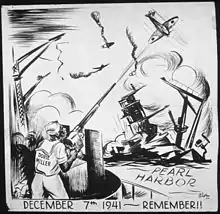
Miller was a crewman aboard the West Virginia and awoke at 6 a.m. on December 7, 1941. He served breakfast mess and was collecting laundry at 7:57 a.m. when Lieutenant Commander Shigeharu Murata from the Japanese aircraft carrier Akagi launched the first of seven torpedoes that hit West Virginia.[11] The "Battle Stations" alarm went off; Miller headed for his battle station, an anti-aircraft battery magazine amidships, only to discover that a torpedo had destroyed it.
He went then to "Times Square", a central spot aboard the ship where the fore-to-aft and port-to-starboard passageways crossed, reporting himself available for other duty.[11] Lieutenant Commander Doir C. Johnson, the ship's communications officer, spotted Miller and saw the potential of his powerful build, so he ordered him to accompany him to the conning tower on the flag bridge to assist in moving the ship's captain, Mervyn Bennion, who had a gaping wound in his abdomen where he had apparently been hit by shrapnel after the first Japanese attack.[14] Miller and another sailor lifted the skipper but were unable to remove him from the bridge, so they carried him on a cot from his exposed position on the damaged bridge to a sheltered spot on the deck behind the conning tower where he remained during the second Japanese attack.[15][4] Captain Bennion refused to leave his post, questioned his officers and men about the condition of the ship, and gave orders and instructions to crew members.[16] Unable to go to the deck below because of smoke and flames, he was carried up a ladder to the navigation bridge where he would soon die from the loss of too much blood despite the aid from a pharmacist mate.[17] He was posthumously awarded the Medal of Honor.[18]
Lieutenant Frederic H. White had ordered Miller to help him and Ensign Victor Delano load the unmanned number 1 and number 2 Browning .50 caliber anti-aircraft machine guns aft of the conning tower.[19] Miller was not familiar with the weapon, but White and Delano instructed him on how to operate it. Delano expected Miller to feed ammunition to one gun, but his attention was diverted and, when he looked again, Miller was firing one of the guns. White then loaded ammunition into both guns and assigned Miller the starboard gun.[11]
Miller fired the gun until he ran out of ammunition, when he was ordered by Lieutenant Claude V. Ricketts to help carry the captain up to the navigation bridge out of the thick oily smoke generated by the many fires on and around the ship; Miller who was officially credited with downing at least two enemy planes,[4] stated later, "I think i got one of those Jap planes. "They were diving pretty close to us". Japanese aircraft eventually dropped two armor-piercing bombs through the deck of the battleship and launched five 18-inch (460 mm) aircraft torpedoes into her port side. When the attack finally lessened, Miller helped move injured sailors through oil and water to the quarterdeck, thereby "unquestionably saving the lives of a number of people who might otherwise have been lost."[20]
The ship was heavily damaged by bombs, torpedoes, and resulting explosions and fires, but the crew prevented her from capsizing by counter-flooding a number of compartments. Instead, West Virginia sank to the harbor bottom as her surviving crew abandoned ship, including Miller. On December 15, Miller was transferred to the heavy cruiser Indianapolis (CA-35).
Commendation
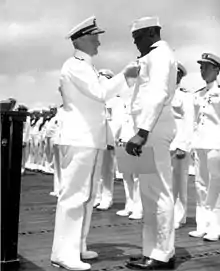
On January 1, 1942, the Navy released a list of commendations for actions on December 7. Among them was a single commendation for an unnamed black man. The National Association for the Advancement of Colored People (NAACP) had asked President Franklin D. Roosevelt to award the Distinguished Service Cross to the unknown black sailor. The Navy Board of Awards received a recommendation that the sailor be considered for recognition. On March 12, an Associated Press story named Miller as the sailor, citing the African-American newspaper Pittsburgh Courier;[21] additional news reports credited Lawrence D. Reddick with learning the name through correspondence with the Navy Department.[22] In the following days, Senator James M. Mead (D-NY) introduced a Senate bill [S.Res. 2392] to award Miller the Medal of Honor,[23] and Representative John D. Dingell, Sr. (D-MI) introduced a matching House bill [H.R. 6800].[24]
Miller was recognized as one of the "first US heroes of World War II". He was commended in a letter signed by Secretary of the Navy Frank Knox on April 1, and the next day, CBS Radio broadcast an episode of the series They Live Forever, which dramatized Miller's actions.[11]
Black organizations began a campaign to honor Miller with additional recognition. On April 4, the Pittsburgh Courier urged readers to write to members of the congressional Naval Affairs Committee in support of awarding the Medal of Honor to Miller.[25] The All-Southern Negro Youth Conference launched a signature campaign on April 17–19. On May 10, the National Negro Congress denounced Knox's recommendation against awarding Miller the Medal of Honor. On May 11, President Roosevelt approved the Navy Cross for Miller.[26]
On May 27, Miller was personally recognized by Admiral Chester W. Nimitz, Commander in Chief, Pacific Fleet, aboard the aircraft carrier Enterprise (CV-6) at anchor in Pearl Harbor.[27] Nimitz presented Miller with the Navy Cross, at the time the third-highest Navy award for gallantry during combat, after the Medal of Honor and the Navy Distinguished Service Medal (on August 7, 1942, Congress revised the order of precedence, placing the Navy Cross above the Distinguished Service Medal in precedence).
Nimitz said of Miller's commendation, "This marks the first time in this conflict that such high tribute has been made in the Pacific Fleet to a member of his race and I'm sure that the future will see others similarly honored for brave acts."[27]
Return to United States and the war
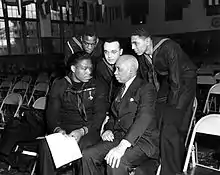

Miller was advanced in rank to Mess Attendant First Class on June 1, 1942.[19] On June 27, the Pittsburgh Courier called for him to be allowed to return home for a war bond tour along with white war heroes.[28] On July 25, the Pittsburgh Courier ran a photo of Miller with the caption "He Fought... Keeps Mop" next to a photo of a white survivor of the Pearl Harbor attack receiving an officer's commission.[29] The photo caption stated that the Navy felt that Miller was "too important waiting tables in the Pacific" for him to return to the United States.
On November 23, Miller returned to Pearl Harbor and was ordered on a war bond tour while still attached to Indianapolis.[11] In December, and January 1943, he gave presentations in Oakland, California, in his hometown of Waco, in Dallas, and to the first graduating class of black sailors from Great Lakes Naval Training Station.[19]
He then reported to Puget Sound Navy Yard at Bremerton, Washington on May 15, and was advanced to Cook Third Class on June 1 when he reported to the escort carrier Liscome Bay (CVE-56).[1] He was featured on the 1943 Navy recruiting poster "Above and beyond the call of duty", designed by David Stone Martin.[30]
Death
After training in Hawaii, Liscome Bay and Miller took part in the Battle of Makin beginning on November 20, 1943.[31] On November 24, the ship was struck in the stern by a torpedo from the Japanese submarine I-175.[32] The aircraft bomb magazine detonated a few moments later, causing the ship to sink in 23 minutes. There were 272 survivors from the crew of over 900,[33] but Miller was among the two-thirds of the crew listed as "presumed dead".[34] His parents were informed that he was missing in action on December 7, 1943, two years after his heroic actions at Pearl Harbor.[11]
A memorial service was held on April 30, 1944, at the Second Baptist Church in Waco, Texas, sponsored by the Victory Club.[11] On May 28, a granite marker was dedicated at Moore High School in Waco to honor him.[11] Miller was officially declared dead by the Navy on November 25, 1944, a year and a day after the loss of Liscome Bay.
Military awards
Miller's decorations and awards:
Navy Cross citation
For distinguished devotion to duty, extraordinary courage and disregard for his own personal safety during the attack on the Fleet in Pearl Harbor, Territory of Hawaii, by Japanese forces on December 7, 1941. While at the side of his Captain on the bridge, Miller, despite enemy strafing and bombing and in the face of a serious fire, assisted in moving his Captain, who had been mortally wounded, to a place of greater safety, and later manned and operated a machine gun directed at enemy Japanese attacking aircraft until ordered to leave the bridge.[35]
Legacy
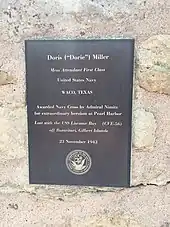

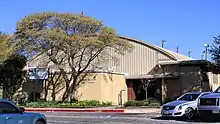
.jpg.webp)
- Memorials
- Doris Miller Memorial, a public art installation honoring Miller on the banks of the Brazos River in Waco, Texas.[36] Groundbreaking held in October 2015.[37] A nine-foot bronze statue was unveiled on December 7, 2017, temporarily located at nearby Bledsoe–Miller Park.[38]
- A bronze commemorative plaque at the Doris Miller Park housing community located near Naval Station Pearl Harbor; organized by the Alpha Kappa Alpha sorority and dedicated on October 12, 1991, which would have been Miller's 72nd birthday.[39][40]
- Plaque in the Memorial Courtyard at the National Museum of the Pacific War in Fredericksburg, Texas.[41]
- Schools
- Dorie Miller Intermediate School, Ennis, Texas[42]
- Doris Miller Elementary School, San Antonio, Texas (opened 1947)[43]
- Doris Miller Elementary School, San Diego, California (dedicated April 28, 1976)[44]
- Dorie Miller Elementary School, Waco, Texas (closed 2012)[45]
- Doris Miller Middle School, San Marcos, Texas[46]
- Community-related (e.g. streets & parks)
- Bledsoe–Miller Community Center, recreation facility in Waco, Texas,[47] jointly named for Jules Bledsoe
- Dorie Miller Community Center, recreation facility in San Antonio, Texas[48]
- Dorie Miller Drive, Champaign, Illinois[49]
- Dorie Miller Homes, a housing community in Gary, Indiana[50]
- Dorie Miller Houses, a housing cooperative complex built in 1953 in the Corona neighborhood of Queens, New York[51]
- Dorie Miller Park, Lewisburg, West Virginia[52]
- Doris Miller Auditorium, in Rosewood Park in Austin, Texas[53]
- Doris Miller Community Center, recreation facility in Newport News, Virginia[54]
- Doris Miller Family YMCA, Waco, Texas[55]
- Doris Miller Loop, Honolulu, Hawaii,[56] with monument located at north end of street
- Doris Miller Memorial Park, a cemetery on the border of Waco and Bellmead, Texas[57]
- Dorie Miller Recreation Center, San Antonio, Texas[58]
- Military-related
- USS Miller (FF-1091), a destroyer escort (reclassified as a Knox-class frigate on June 30, 1975)[59] was commissioned on June 30, 1973, in honor of Miller;[60] Miller was decommissioned on October 15, 1991.
- Bachelor Enlisted Quarters at Naval Station Great Lakes was dedicated in Miller's memory on December 7, 1971[61]
- Dorie Miller Galley, the main galley for Camp Lemonnier in Djibouti[62]
- Doris Miller Dining Hall, located at Recruit Training Command, Great Lakes, Illinois
- Doris Miller Dining Hall, located at Naval Air Station Chase Field, Beeville, Texas[63]
- Doris Miller Park, a housing community for military personnel in Honolulu[64]
- USS Doris Miller (CVN-81), a future Gerald R. Ford-class aircraft carrier.[7][65] (Officially announced January 19, 2020)
- Veteran-related
- Dorie Miller Chapter 14 – Disabled American Veterans chapter in Washington, D.C.[66]
- Dorie Miller Post 546 – American Legion post in Racine, Wisconsin[67]
- Dorie Miller Post 915 – American Legion post in Chicago[68]
- Dorie E. Miller Post 817 – American Legion post in Beaumont, Texas[69]
- Doris Miller Department of Veterans Affairs Medical Center in Waco, Texas;[70][71] includes monument and a road named Doris Miller Circle[72]
- Radio
- In 1942, Miller's actions were dramatized on the CBS Radio series They Live Forever.[73]
- The April 25, 1944, episode of the CBS Radio series Columbia Presents Corwin, titled "Dorie Got a Medal", starred Canada Lee and Josh White in Norman Corwin's "jazz-and-jive opera" about Miller.[74][75]
- On the December 9, 1945, broadcast of his ABC radio series Orson Welles Commentaries, Orson Welles presented a tribute to Doris Miller and spoke to his father, Connery Miller.[76] Broadcast from the U. S. Naval Training and Distribution Center on Treasure Island, San Francisco, the program announced the naming of three theater complexes to honor three World War II heroes killed in action. Theater One was named for Doris Miller; the other two theaters were named for Medal of Honor recipients John Basilone and Edward O'Hare.[77][78]
- Film
- Although he is not identified by name, Miller is portrayed by Elven Havard in the 1970 film Tora! Tora! Tora![79]
- In Michael Bay's 2001 film Pearl Harbor, Miller is portrayed by actor Cuba Gooding Jr.[80][81]
- Miller being awarded the Navy Cross was portrayed in the 2019 film Midway.
- Other
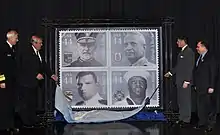
- Founded in 1943, the Dorie Miller Foundation began giving an annual award in 1947 to an individual or group considered outstanding in the field of race relations.[61][82] Recipients included Jackie Robinson, Jesse Owens, and Eleanor Roosevelt.[83] The award later became the American Heritage & Freedom Award.[84]
- The Gwendolyn Brooks poem Negro Hero (1945) is narrated from Miller's point of view.[85]
- In 2002, Molefi Kete Asante included Miller on his list of 100 Greatest African Americans.[86]
- Miller was honored by the United States Postal Service as one of four Distinguished Sailors, with a 44-cent commemorative stamp issued on February 4, 2010.[87] Also honored were William Sims, Arleigh Burke, and John McCloy.
- Representative Eddie Bernice Johnson (D-TX) proposed bills in 2016, 2017, and 2020 that would have authorized the Medal of Honor for Miller. None of these bills were ever voted upon by either the House of Representatives or the Senate.[88][89][90][91]
In Season 5, Episode 10 of the science fiction television series The Expanse, set in the 24th century, an arrivals board at the Lovell City Terminal on Luna (the Moon) shows the UNN Dorie Miller as “on time”.
See also
 Biography portal
Biography portal- Elvin Bell
- Charles French
References
- "Transcript of Service". Naval History and Heritage Command. Retrieved 2018-01-15.
- Desk, Bob D'Angelo, Cox Media Group National Content. "Navy to name aircraft carrier after black Pearl Harbor hero Doris Miller on MLK Day". KIRO. Retrieved 2020-01-20.
- McRae, Jr, Bennie J. "Dorie Miller". Hampton University. Retrieved June 20, 2012.
- Chester, Robert K. (March 2013). "'Negroes' Number One Hero': Doris Miller, Pearl Harbor, and Retroactive Multiculturalism in World War II". American Quarterly (65): 31–61.
- "USS Miller (DE/FF-1091)". Naval History and Heritage Command. 2019. Retrieved February 2, 2021.
- LaGrone, Sam (January 18, 2020). "Next Ford-class Carrier to be Named After Pearl Harbor Hero Doris Miller". USNI News. Retrieved January 18, 2020.
- Affairs, This story was written by Acting Secretary of the Navy Public. "Navy Will Name A Future Ford Class Aircraft Carrier After WWII Hero Doris Miller". www.navy.mil. Retrieved 2020-01-20.
- McDonald, Archie P. (April 11, 2005). "Doris Miller: Hero". texasescapes.com. Retrieved February 7, 2018.
- Danner, Megan. "Doris Miller". wacohistory.org. Retrieved February 7, 2018.
- Aiken, David. "Doris Miller and his Navy Cross: a brief biography". Pearl Harbor Message Board. Retrieved June 20, 2012.
- "Mess Attendant Turned Machine Gun on Japanese". Pittsburgh Courier. March 14, 1942. Retrieved February 7, 2018 – via newspapers.com.
- "Beyond the Movie: Pearl Harbor: Ship's Cook Third Class Doris "Dorie" Miller". National Geographic. 2001. Retrieved August 17, 2015.
- Biographical sketch by Howard S Bennion
- Biographical sketch by Howard S Bennion
- Biographical sketch by Howard S Bennion
- Biographical sketch by Howard S Bennion
- "#VeteranOfTheDay Navy Veteran Mervyn Bennion". US Department of Veterans Affairs. 2020. Retrieved February 4, 2021.
- Chamberlain, Gaius (2012-01-25). "Doris Miller". Great Black Heroes. Adscape International, LLC. Retrieved 2017-03-02.
- "USS West Virginia's Action Report". Naval History and Heritage Command. 2015. Retrieved August 17, 2015.
- "Negro Revealed as 'Messman Hero' at Pearl Harbor". Oakland Tribune. March 12, 1942. Retrieved February 8, 2018 – via newspapers.com.
- "Identify Heroic Mess Attendant Who Manned Machine Gun Against Japs During Pearl Harbor Attack". New York Age. March 14, 1942. Retrieved February 8, 2018 – via newspapers.com.
- "History of Bills and Resolutions" (PDF). gpo.gov. p. 563. Retrieved February 8, 2018. (left column) S. 2392
- "History of Bills and Resolutions" (PDF). gpo.gov. p. 616. Retrieved February 8, 2018. (right column) H.R. 6800
- "Write These Congressmen". Pittsburgh Courier. April 4, 1942. Retrieved February 8, 2018 – via newspapers.com.
- "Navy Decorates Negro Hero". Salt Lake Telegram. INS. May 11, 1942. Retrieved February 8, 2018 – via newspapers.com.
- "Negro Messboy Gets Navy Cross at Pearl Harbor". Chicago Tribune. May 28, 1942. Retrieved February 8, 2018 – via newspapers.com.
- "Courier Campaigns for Return of Dorie". Pittsburgh Courier. June 27, 1942. Retrieved February 7, 2018 – via newspapers.com.
- "He Fought... Keeps Mop". Pittsburgh Courier. July 25, 1942. Retrieved February 7, 2018 – via newspapers.com.
- "Above and beyond the call of duty – Dorie Miller received the Navy Cross at Pearl Harbor, May 27, 1942,". Library of Congress. Retrieved March 16, 2014.
- Aguirre, Elizabeth (7 December 2016). "A Pearl Harbor Hero, Still Waiting for the Proper Recognition". Ebony.com. Retrieved 13 January 2019.
- "The Sinking of USS Liscome Bay". National Naval Aviation Museum. 24 November 2014. Retrieved 13 January 2019.
- Copeland, Mike (19 October 2018). "Doris Miller Memorial takes shape as donation gap remains". Wacotrib.com. BH Media Group, Inc. Archived from the original on 30 October 2018. Retrieved 13 January 2019.
- Smith, J. B. (1 January 2018). "War hero, civil rights hero: New Doris Miller bio widens view of Waco". Wacotrib.com. BH Media Group, Inc. Archived from the original on 11 January 2018. Retrieved 13 January 2019.
- "Doris Miller's Navy Cross Citation". Naval History and Heritage Command. 2020. Retrieved February 1, 2021.
- "Doris Miller Memorial". dorismillermemorial.org. Retrieved February 7, 2018.
- Messer, Olivia (October 12, 2015). "Groundbreaking held for riverside Doris Miller Memorial". Waco Tribune-Herald. Retrieved February 7, 2018.
- Smith, J. B. (December 7, 2017). "Pearl Harbor Hero". Waco Tribune-Herald. Retrieved February 7, 2018.
- Douglas, Karen (October 29, 1991). "Remembering a fallen hero". Lansing State Journal. Lansing, Michigan. Retrieved February 7, 2018 – via newspapers.com.
- Sergeant, Jacqueline (October 11, 1991). "WWII hero honored through local effort". Poughkeepsie Journal. Poughkeepsie, New York. Retrieved February 7, 2018 – via newspapers.com.
- "Memorial Courtyard". pacificwarmuseum.org. Retrieved February 7, 2018.
- "Dorie Miller Intermediate". ennis.k12.tx.us. Retrieved February 7, 2018.
- "School History". saisd.net. Retrieved February 7, 2018.
- "About Our School". sandiegounified.org. Retrieved February 7, 2018.
- "Doris Miller Elementary School". publicschoolreview.com. Retrieved February 7, 2018.
- "Doris Miller Middle School". Retrieved February 7, 2018 – via Google Maps.
- "Community Centers". waco-texas.com. Retrieved February 7, 2018.
- "Dorie Miller Community Center". sanantonio.gov. Retrieved February 7, 2018.
- "Dorie Miller Dr". Retrieved February 7, 2018 – via Google Maps.
- "GHA Properties". Gary Housing Authority. Retrieved February 7, 2018.
- "Dorie Miller 113-15 34th Avenue". The New York Times. Retrieved February 7, 2018.
- MacKenzie, Peggy (July 21, 2017). "Phase I of Dorie Miller Park near completion". MountainMessenger.com. Retrieved February 7, 2018.
- "Doris Miller Recreation Center". Retrieved February 7, 2018 – via Google Maps.
- "Doris Miller Community Center". nngov.com. Retrieved February 7, 2018.
- "Doris Miller Family YMCA". Retrieved February 7, 2018 – via Google Maps.
- "Doris Miller Loop". Retrieved February 7, 2018 – via Google Maps.
- "Doris Miller Memorial Park". Retrieved February 7, 2018 – via Google Maps.
- "Dorie Miller Recreation Center San Antonio". eventful.com. Retrieved February 7, 2018.
- "USS Miller (DE/FF-1091)". Naval History and Heritage Command. 2019. Retrieved February 2, 2021.
- Pitt, Leon (July 4, 1973). "Navy Ship Is Named For Black War Hero". Detroit Free Press. Retrieved February 7, 2018 – via newspapers.com.
- "Waco War Hero Honored Tuesday". The Waco Citizen. Waco, Texas. December 9, 1971. Retrieved February 7, 2018 – via newspapers.com.
- "Dorie Miller Galley". basedirectory.com. Retrieved February 7, 2018.
- Cutrer, Thomas W.; Parrish, T. Michael (2017). Doris Miller, Pearl Harbor, and the Birth of the Civil Rights Movement. Texas A&M University Press. ISBN 1623496020.
- "Doris Miller Park". ohananavycommunities.com. Retrieved February 7, 2018.
- Jay Price (September 29, 2020). "A Military 1st: A Supercarrier Is Named After An African American Sailor". NPR. Retrieved September 29, 2020.
- "Dorie Miller #14". davmembersportal.org. Retrieved February 7, 2018.
- Golub, Rob (May 24, 2001). "Local Legion post named for Pearl Harbor hero". The Journal Times. Racine, Wisconsin. Retrieved February 9, 2018.
- "Dorie Miller Post #915". doriemiller915.org. Archived from the original on December 3, 2013. Retrieved August 24, 2013.
- "Dorie E. Miller Post 817". dorieemiller.org. Retrieved February 7, 2018.
- "Doris Miller Department of Veterans Affairs Medical Center". centraltexas.va.gov. Retrieved February 7, 2018.
- 113th United States Congress H.R. 4199 at Congress.gov
- "Doris Miller Cir". Retrieved February 7, 2018 – via Google Maps.
- "A Page From Our American Story: December 7, 1941 Heroes". Smithsonian Institution. 2009. Retrieved August 17, 2015.
- "Columbia Presents Corwin". RadioGOLDINdex. Retrieved March 16, 2014.
- "Air Program Honors Dorie". Pittsburgh Courier. April 29, 1944. Retrieved February 9, 2018 – via newspapers.com.
- "Orson Welles Wartime Broadcasts". Internet Archive. Retrieved March 15, 2014.
- "Treasure Island Medal of Honor Dedication: Orson Welles ABC KGO Broadcast Script and Photograph Lot". Snyder's Treasure Trove: Collectible Militaria. Archived from the original on March 16, 2014. Retrieved March 16, 2014.
- "Welles To Honor O'Hare on KXOK". St. Louis Star-Times. December 8, 1945. Retrieved February 9, 2018 – via newspapers.com.
- "Tora! Tora! Tora! (1970) – Full Cast & Crew". IMDb. Retrieved February 7, 2018 – via YouTube.
- "Pearl Harbor (2001)". IMDb. Retrieved February 7, 2018.
- "Pearl Harbour – Cook takes A.A Gun". Retrieved February 7, 2018 – via YouTube.
- "Zumwalt to receive Dorie Miller award". Pittsburgh Courier. September 22, 1972. Retrieved February 7, 2018 – via newspapers.com.
- "Rev. Elmer L. Fowler, 83". Chicago Tribune. June 6, 2003. Retrieved February 7, 2018 – via newspapers.com.
- Fountain, John W. (May 21, 1990). "Black Navy captain is honored". Chicago Tribune. Retrieved February 7, 2018 – via newspapers.com.
- Brooks, Gwendolyn (1945). "Negro Hero (To suggest Doris Miller)". Common Ground. pp. 44–45. Retrieved February 7, 2018 – via unz.org.
- Asante, Molefi Kete (2002). 100 Greatest African Americans: A Biographical Encyclopedia. Amherst, New York: Prometheus Books. ISBN 1-57392-963-8.
- Culp, Cindy V. (February 4, 2010). "Local WWII hero Doris Miller being honored with stamp". Waco Tribune-Herald. Retrieved February 7, 2018.
- 114th United States Congress H.R. 6371 at Congress.gov
- 115th United States Congress H.R. 834 at Congress.gov
- 115th United States Congress H.Con.Res. 19 at Congress.gov
- 116th United States Congress H.R. 5549 at Congress.gov
Further reading
- Cutrer, Thomas W.; Parrish, T. Michael (2017). Doris Miller, Pearl Harbor, and the Birth of the Civil Rights Movement. Texas A&M University Press. ISBN 1623496020.
- Miller, Richard E. (2004). The Messman Chronicles: African Americans in the U.S. Navy, 1932–1943. Naval Institute Press. ISBN 1-55750-539-X.
- O'Neal, Bill (2007). Doris Miller: Hero of Pearl Harbor. Waco, Texas: Eakin Press. ISBN 978-1934645017.
- Sapper, Neil (1980). "Aboard the Wrong Ship in the Right Books: Doris Miller and Historical Accuracy". East Texas Historical Journal. 18 (1). Retrieved February 7, 2018.
External links
| Wikimedia Commons has media related to Dorie Miller. |
- USS West Virginia Action Report, for December 7, 1941, via Naval History and Heritage Command
- "Dorie Got A Medal" (audio) from April 25, 1944, via radioechoes.com
- "Orson Welles Commentaries" (audio) from December 9, 1945, via indiana.edu
- The Texas Experience – Tom Landry Presents Dorie Miller (video), Texas Archive of the Moving Image
- Doris Miller Memorial, Cultural Arts of Waco